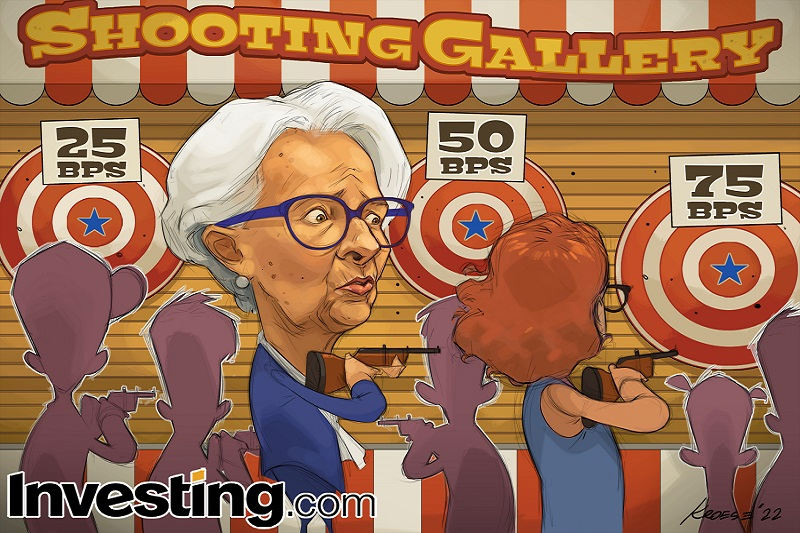By Geoffrey Smith
Investing.com -- The European Central Bank faces one of its toughest meetings ever on Thursday, forced to choose between unpalatable options.
With inflation at a record high of 9.1% and - more importantly - still consistently surprising to the upside, the bank desperately needs to get its interest rates above zero, or else risk losing all credibility as an institution capable of defending its currency’s value.
On the other hand, the Eurozone is much closer to falling into recession as the unprecedented combination of Russian supply cut and western sanctions drives energy prices to levels that will break the economy sooner rather than later.
Those conflicting pressures have already brought out deep-seated divisions along familiar national lines within the bank’s governing council, with members from Germany and elsewhere in northern and eastern Europe calling loudly on the bank to hike rates by as much as 75 basis points at Thursday’s meeting in Frankfurt.
But in contrast to the U.S. Federal Reserve, where former inflation doves such as Neal Kashkari and James Bullard now preach a gospel of tight money orthodoxy with all the zeal of converts, the glaring risk of recession means that the inflation ‘doves’ on the council are still quite willing to stick to their guns and argue that too much aggression now will be a horrible mistake, akin to the rate hikes in 2011 that led directly to the crisis in Eurozone bond markets.
As such, while a hike of some sort is as good as guaranteed, there is genuine uncertainty over how big it will be.
A 75 basis point hike seemed as good as nailed on after board member Isabel Schnabel delivered a hawkish speech at the Fed’s Jackson Hole event, in the same week that Eurozone inflation hit a euro-era record of 9.1%.
However, that belief was sorely tested by events since: Russia’s closure of the Nord Stream gas pipeline from to Germany raised fears of a whole winter without Russian gas, making the prospect of rationing across the region much likelier.
“The Eurozone, and Germany in particular, are heading for a peak in inflation that will be higher, and a recession that will be deeper, than the consensus and the ECB expect,” Berenberg Bank chief economist Holger Schmieding said in a note to clients on Monday.
Comments published on Tuesday in the semi-annual Eurofi magazine by Mario Centeno and Yannis Stournaras, the governors of the central banks of Portugal and Greece, also suggested that Lane will have at least some support in arguing for a more gradual path of rate hikes.
Stournaras said he believes inflation is close to peaking, and will soon begin to decelerate, while Centeno argued that hiking too rapidly in the face of a unique and largely supply-side driven shock could make it harder to escape from the low-iflation problem that dogged the ECB ever since the 2008 financial crisis.
Energy prices have since come off the boil amid reports of a coordinated EU attempt to keep a lid on them throughout the winter. But for the ECB, that is a double-edged sword: the effect of lowering headline inflation rates will doubtless be welcome, but in sustaining overall demand, it will also support the slow trickle-through of inflationary pressures to the non-energy parts of the economy.
Even when food and energy prices are stripped out of the figures, Eurozone inflation was still running at a historic high of 4.3% in August and still accelerating.
Moreover, as analysts at Vontobel Asset Management point out, it isn’t all doom and gloom: bank lending – especially consumer credit – remains strong, and unemployment in the Eurozone is at a historic low of 6.6% of the workforce. Fiscal policy - not least in the shape of a 65 billion-euro energy relief package agreed by the German federal government at the weekend – also remains supportive.
Perhaps the strongest argument for a 75 basis-point hike is that the window for tightening policy is closing fast: The bank arguably needs to get rates up before it becomes politically impossible to do so.
As ING’s Carsten Brzeski said in a note to clients: “Hiking into a recession is one thing. Hiking throughout a recession is another.”
Brzeski reckons the ECB’s last chance to hike will be in October.
The ECB’s recent abandonment of forward guidance means that all outcomes will remain possible beyond then, at least on paper. The split in opinions means that it will be impossible to please everybody as far as rates are concerned. That will make it difficult for President Christine Lagarde to communicate a clear policy at her press conference afterwards.
The ECB isn't going to solve its inflation problem on Thursday, but as long as it doesn't have to resort too heavily afterwards to its new tool for controlling bond market volatility, the Transmission Protection Instrument, in the following days, Lagarde and her crew will have successfully negotiated the most pressing near-term risk.
